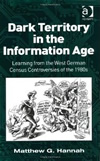Introducing Matthew Hannah
 Matthew G. Hannah is Professor of Human Geography at Aberystwyth University in Wales, UK. He specializes in historical and political geography, particularly in the spatial politics of state knowledge in the modern world. Professor Hannah, a native of Maryland, earned his BSc in Geography at the University of Maryland, and his MSc and PhD degrees at the Pennsylvania State University. He taught at the University of Vermont from 1994 until 2007, moving in that year to Aberystwyth.
Matthew G. Hannah is Professor of Human Geography at Aberystwyth University in Wales, UK. He specializes in historical and political geography, particularly in the spatial politics of state knowledge in the modern world. Professor Hannah, a native of Maryland, earned his BSc in Geography at the University of Maryland, and his MSc and PhD degrees at the Pennsylvania State University. He taught at the University of Vermont from 1994 until 2007, moving in that year to Aberystwyth.
This is the second part of the interview about the book “Dark Territory in the Information Age: Learning from the West German Census Boycotts of the 1980s”. The first part is Matthew Hannah: Germany’s census boycott, police tactics, oppression, biopolitics
Interview
Information Age, informational citizenship and self-determination
How would you define ‘Information Age’ and how has it changed the meanings of territory and sovereignty?
 My use of the term ‘information age’ in the book represents an ultimately inadequate makeshift solution to the problem of how to conceptualise interactions between evolving modes of capital accumulation, shifting modes of governance, and rapid changes in technological infrastructures.
My use of the term ‘information age’ in the book represents an ultimately inadequate makeshift solution to the problem of how to conceptualise interactions between evolving modes of capital accumulation, shifting modes of governance, and rapid changes in technological infrastructures.
I decided to follow Castells’s definition in part because he explicitly attempts to retain the framework of a critical analysis of capitalism. Be that as it may, I did want to frame the story with reference to an identifiable ‘age’ or ‘era’, because doing so helped me make the point that the politics surrounding information technology, which we tend to treat as brand new, already have a history of considerable length.
Of course every discernable period within the history of human knowledge and communication is an ‘information age’ in the sense that it is characterised by a specific complex of modes of expression, storage, transmission and use of information linked to economic, political and cultural systems.
In the book I wanted to say that the political issues we now deal with can be seen to have been explored in a surprisingly full manner already in the earlier phases of our ‘age’. Indeed, the Dutch already boycotted a national census more than ten years before the events in West Germany. This historical framing of the ‘information age’ is one of the themes in the book I would have liked to elaborate more fully.
How would you define informational citizenship and what is its impact on the room for collective action/change?
By the term informational citizenship I mean a way of seeing many different kinds of knowledge about people, not just knowledge about their preferences among official parties or candidates, as forms of political representation.
To exercise informational citizenship would thus be to get involved actively in decisions about what kinds of knowledge are gathered about us, linked to what sorts of social ontologies, by what organisations, to what purpose, what is done with that knowledge, how is it stored and for how long, etc.
Particularly statistical knowledge has, until recently, not been seen in this way. We have tended to see it as somehow neutral and objective.
But the last two decades in particular have seen the emergence of many new ‘politicizing’ approaches to statistical information. Some of these are detailed in the concluding chapter of the book, others by Jeremy Crampton in his comments on the book. Please see the review forum in Political Geography at Science Direct.
The book can give the impression that informational citizenship is primarily a defensive matter of protecting or refusing to surrender data. But as the concluding chapter attempts to make clear, it can also mean seeking to be counted, to increase visibility in situations where marginalized groups or individuals suffer in part as a result of their invisibility.
What is the principle of informational self-determination and to what extent (and where) has it been incorporated in national legislation?
Informational self-determination [in German: ‘informationelle Selbstbestimmung’] is a term coined by the West German Constitutional Court justices in the 1983 decision in which they halted the census.
They meant by it chiefly an individual right to know what data is held on oneself by states and other organisations, how long it is stored, when it will be deleted, whether, how and with whom it is shared, etc. It could be seen as a right that grounds the possibility of informational citizenship, because it also envisions individuals being able to influence the fortunes of personal data held on them.
However, with the term informational citizenship I wanted to radicalize the idea of informational self-determination in a couple of important ways. First, I think it is necessary to establish a much stronger right, as well as realistic means, of allowing people to decide whether to surrender information at all, not merely what kind. Information gathering is inescapably a matter of epistemic sovereignty (see above), and citizenship in relation to that sovereignty must include the right to refuse any information.
Secondly, informational citizenship is conceived to extend far beyond the individual level to encompass collective and institutional changes that could establish a much more robust infrastructure for dealing with statistical data as a matter of political representation. These ideas are detailed much more fully in the conclusion of the book.
The future of domestic security, social knowledge and democracy
What are the most common definitions of domestic security and why do you expect these definitions to expand in the future?
The two main poles of inherited definitions of ‘security’ are, on the one hand, protection against (violent) bodily harm or theft or damage to property, and on the other, a more ‘social’ or, if you like, ‘biopolitical’ emphasis on the well being of human populations or individuals.
Many commentators have noticed that the neo-liberal regimes of government we have had to cope with for the past thirty years tend to invest in the former and disinvest in the latter. In my response to comments in the Political Geography review forum (see URL above), I suggest that we are not so much seeing a shift away from a biopolitics of populations but rather a shift from a biopolitics fostering the well-being of human populations to a biopolitics that cultivates the global population of capitals.
As property and wealth become the ever more exclusive beneficiaries of neo-liberal governance, states will see themselves forced to invest ever more heavily in ‘security services’ tasked with suppressing human opposition. The Occupy movements and the demonstrations against European austerity in Greece and elsewhere will be seen as major watersheds marking a new intensification of this dynamic.
What is social knowledge and how could we democratize it (further)?
As suggested above, ‘social knowledge’ is an umbrella term for any form of knowledge about society that is relevant to the ways in which social reality is governed.
This can include traditional ‘political’ knowledge such as electoral results, but also various forms of survey and polling results. I have tried in the book to put forward official statistical knowledge as another major category of social knowledge.
But beyond these categories we should also include academic knowledge in whatever form, and narrative forms of knowledge through which we weave coherent stories about who we are and how we should be governed. Unlike some scholars, I continue to believe that in this narrative sphere, it still makes sense to speak of deceptive ‘ideologies’, not merely of different constructions.
While I would generally support the politicization of all of these forms of knowledge, I also recognize the dangers of radically democratizing their production, and thereby allowing all comparability between different knowledges to evaporate (see Crampton’s comments in the Political Geography forum). This is particularly pertinent with respect to statistical knowledge, where the possibility of using it for humane as well as for inhumane purposes depends centrally on some baseline level of standardization through time and across geographical contexts.
However, in this as in all politics of knowledge, it seems to me that the burden of demonstration should always lie with those who would limit democratization rather than with those who would push it further.
